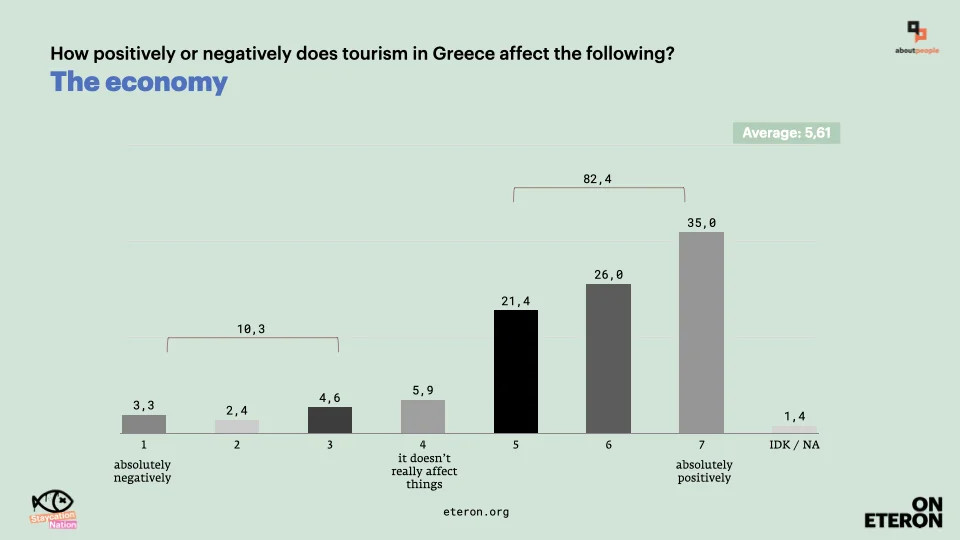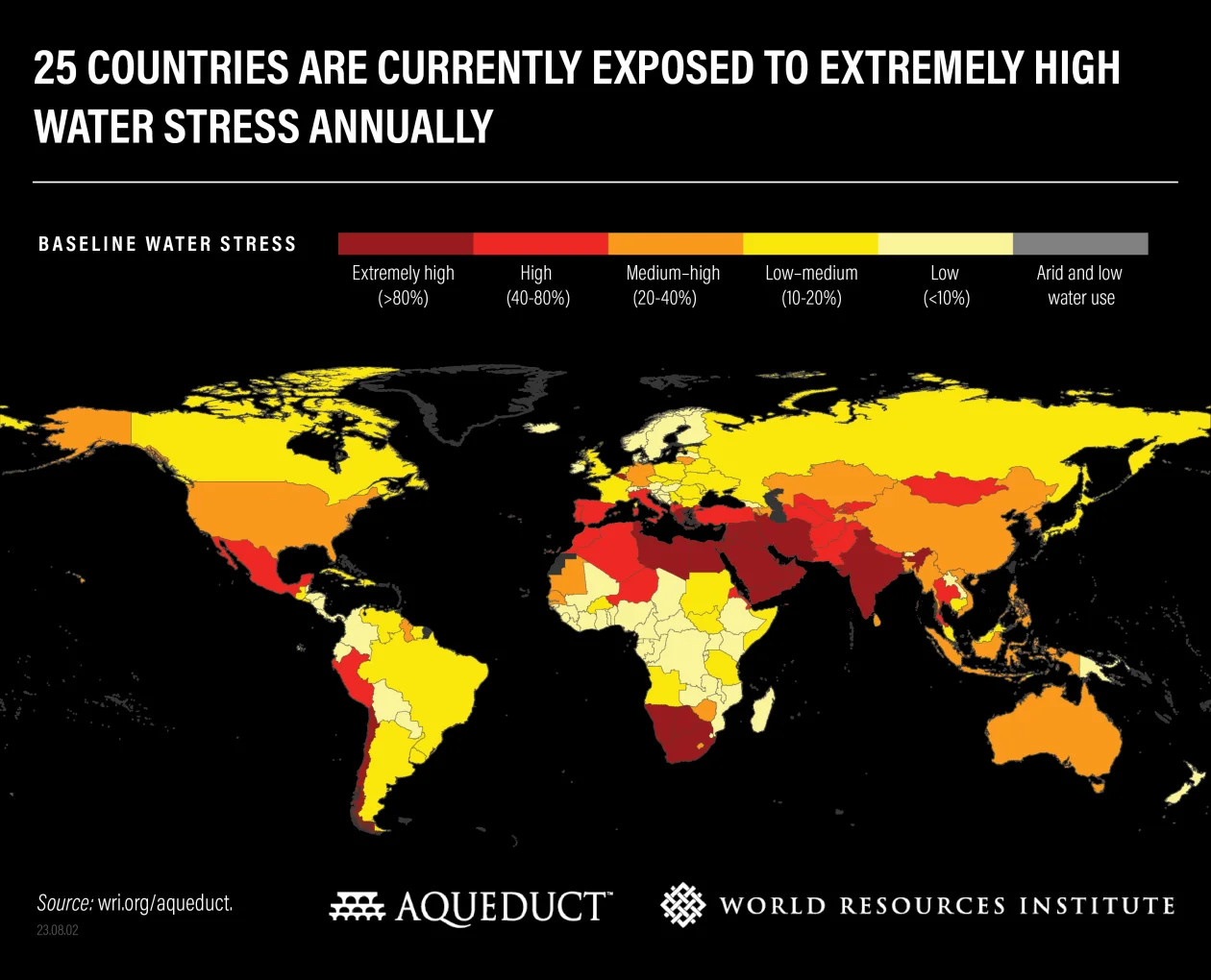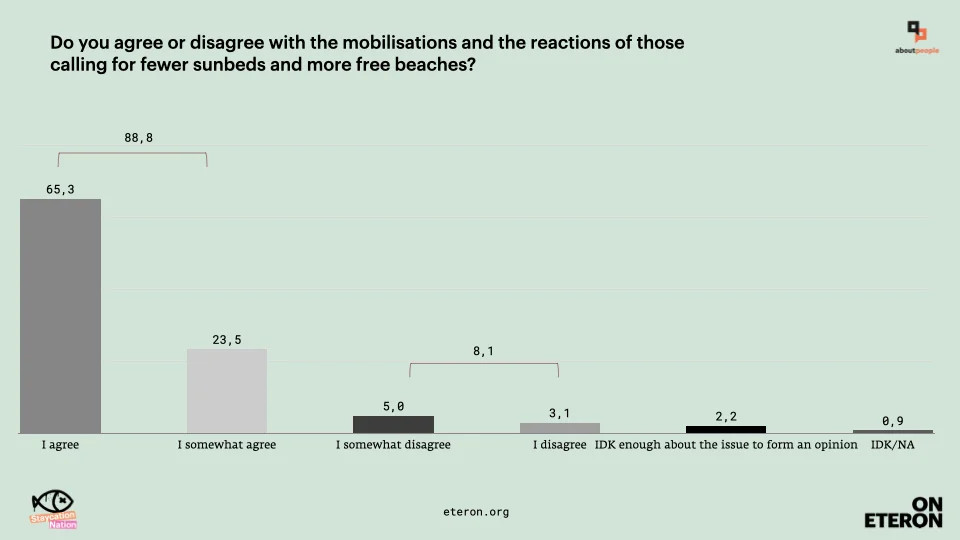Are you dreaming of a Greek getaway but also concerned about the impact of tourism? The allure of ancient ruins, stunning beaches, and vibrant culture draws millions to Greece each year. While tourism significantly boosts the Greek economy, it also presents some challenges. At SIXT.VN, we understand these concerns and aim to provide you with travel solutions that minimize negative impacts while maximizing your enjoyment. By being informed and choosing sustainable travel options, you can contribute to preserving the beauty and authenticity of Greece.
1. Understanding Overtourism in Greece
Overtourism happens when too many tourists visit a place, straining its resources and negatively affecting the environment and the local people. This situation can lead to problems like damage to natural areas, higher living costs for residents, and the loss of local culture.
1.1. Defining Overtourism
Overtourism is when the number of tourists exceeds the area’s capacity. This leads to negative impacts on the environment and the local community. Overtourism can deplete natural resources, raise living costs, and disrupt the quality of life for local residents (Seraphin et al., 2018). According to Koens et al. (2018), it’s “the excessive negative impact of tourism on the host communities and/or natural environment.” This includes environmental pollution, increased living costs, congested infrastructure, and the alteration of local culture.
1.2. The Lure of Greece: Why Tourism Matters
Greece is a top tourist destination, attracting visitors with its rich history, stunning landscapes, and vibrant culture. Tourism significantly contributes to the Greek economy, providing jobs and revenue. However, this popularity also raises concerns about overtourism and its negative impacts. Balancing economic benefits with environmental and social sustainability is crucial for the long-term well-being of Greece.
2. Economic Impacts of Tourism
While tourism brings many economic benefits, it’s essential to be aware of its potential downsides. These include rising living costs, economic dependency, and market failures (Dwyer et al., 2020).
2.1. The Upside: Economic Benefits and Job Creation
Tourism can significantly boost local economies by creating jobs and increasing state revenues. In 2023, tourism directly contributed 13% to Greece’s GDP, totaling 28.5 billion euros, the highest share to date (Ikkos & Koutsos, 2024). Considering tourism’s indirect contribution through multipliers, the share increases to approximately 30%. This growth reflects the country’s strategic investment in tourism. According to INSETE, travel earnings covered 63.8% of the goods balance deficit. In 2023, arrivals reached 32.7 million (+4.4% compared to 2019 and +17.6% compared to 2022), not including cruises, which push the number to 36.1 million.
2.2. The Downside: Rising Costs and Market Failure
Local businesses thrive during peak seasons, but tourism can also inflate housing and goods prices, making it difficult for local residents to afford basic necessities. While not currently a market failure as described by Dwyer et al. (2020), there are growing concerns about the negative aspects of the industry.
2.3. The Perception of Rising Costs
Surveys show that people feel tourism is linked to increased prices of goods and rents, with these categories receiving the lowest ratings (under 3%). 65.2% of survey participants view tourism’s impact as negative when it comes to expensiveness, and 78.7% feel the same about rental costs.
 Greek Town with High Volume of Tourists
Greek Town with High Volume of Tourists
3. Environmental Impacts of Tourism
Increased tourism activity often leads to pollution, depletion of natural resources, and degradation of local ecosystems (Seraphin et al., 2018). Examining residents’ perceptions of environmental impact, including water and electricity shortages and pollution, is crucial. This helps reveal how residents perceive the sustainability of their environment (Milano et al., 2019).
3.1. Damage to Natural Resources
According to survey data, 63.5% of citizens acknowledge the environmental damage caused by intense economic activity in the tourism sector.
3.2. Water Stress and Resource Depletion
Greece experiences extremely high water stress, as highlighted by the World Resources Institute (WRI) and research by Kuzma, Saccoccia, and Chertock (2023). This leads to water scarcity in several regions during the summer (Liaggou, 2024).
 World Map of Annual Baseline Water Stress Levels Per Country
World Map of Annual Baseline Water Stress Levels Per Country
3.3. Impact on Public Spaces and Cultural Heritage
While tourism can have positive impacts on Greece’s image, there are negative effects on public spaces. A significant 88.8% of survey respondents support mobilizations for free beaches and fewer sunbeds.
4. Impact on Quality of Life
Overtourism can burden local infrastructure, leading to non-functional public spaces and services that negatively affect residents’ daily lives (Koens et al., 2018).
4.1. Decreased Satisfaction
Residents in touristic areas show a 6.5% decrease in satisfaction levels compared to those in non-touristic areas when asked to evaluate the impact of tourism in Greece.
 Crowded Beach in Greece with many sunbeds
Crowded Beach in Greece with many sunbeds
4.2. Perceptions of Overtourism
Around 30.5% of Greeks believe overtourism is an existing problem, while 45.6% think it’s not yet a problem but could become one in the future. Only 19.6% believe that more arrivals are always better for Greece.
5. Case Studies: Regions Under Pressure
Certain regions in Greece, such as the South Aegean, Ionian Islands, and Crete, experience higher levels of tourism expenditure as a percentage of GDP, reflecting intense touristic activity.
5.1. Challenges in Island Regions
Island regions like Santorini and Mykonos face unique challenges due to their limited resources and infrastructure. The influx of tourists can strain water supplies, increase waste, and disrupt local life.
5.2. Athens and Historical Sites
Athens, with its historical sites like the Acropolis, also experiences significant tourist pressure. This can lead to overcrowding, damage to ancient monuments, and strain on local transportation.
6. Sustainable Tourism Practices
To mitigate the negative impacts of tourism, it’s essential to adopt sustainable practices that protect the environment, support local communities, and enhance the visitor experience.
6.1. Eco-Friendly Accommodations
Choosing eco-friendly hotels and accommodations that prioritize energy efficiency, waste reduction, and responsible water use can minimize your environmental footprint.
6.2. Supporting Local Businesses
Opting for local restaurants, shops, and tour operators helps to support the local economy and preserve the cultural authenticity of the destination.
6.3. Respecting Local Culture
Being mindful of local customs, traditions, and etiquette can help to foster positive interactions with residents and minimize cultural disruption.
6.4. Reducing Waste
Bringing reusable water bottles, shopping bags, and avoiding single-use plastics can help to reduce waste and protect the environment.
6.5. Responsible Transportation
Using public transportation, walking, or cycling instead of renting a car can help to reduce traffic congestion and air pollution.
6.6. Preserving Natural Resources
Conserving water and energy, avoiding littering, and respecting wildlife habitats can help to preserve the natural beauty of Greece.
7. Solutions for Managing Overtourism
Addressing overtourism requires a multi-faceted approach involving government policies, community initiatives, and responsible tourism practices.
7.1. Government Regulations
Implementing policies that limit the number of tourists, manage cruise ship arrivals, and protect cultural heritage sites can help to mitigate the negative impacts of overtourism.
7.2. Community Involvement
Engaging local communities in tourism planning and decision-making can ensure that their voices are heard and their interests are protected.
7.3. Infrastructure Improvements
Investing in infrastructure improvements, such as waste management systems, water treatment plants, and public transportation, can help to accommodate tourists while minimizing environmental impacts.
7.4. Raising Awareness
Educating tourists about responsible tourism practices and the impacts of their behavior can encourage them to make more sustainable choices.
7.5. Diversifying Tourism
Promoting alternative destinations, off-season travel, and niche tourism products can help to distribute tourists more evenly and reduce pressure on popular areas.
8. SIXT.VN’s Commitment to Sustainable Tourism in Greece
At SIXT.VN, we are committed to promoting sustainable tourism practices that benefit both travelers and local communities in Greece. We offer a range of services designed to minimize negative impacts and enhance your travel experience.
8.1. Eco-Friendly Transportation Options
We provide a selection of hybrid and electric vehicles for rent, allowing you to explore Greece with a reduced carbon footprint.
8.2. Supporting Local Communities
We partner with local businesses and tour operators that prioritize sustainability and community development.
8.3. Responsible Travel Tips
We offer resources and information to help you make informed decisions about your travel choices and minimize your environmental and social impact.
8.4. Customized Itineraries
We can create customized itineraries that focus on sustainable tourism practices, allowing you to experience the beauty and culture of Greece responsibly.
9. The Future of Tourism in Greece
The future of tourism in Greece depends on our ability to balance economic growth with environmental and social sustainability. By embracing responsible tourism practices and working together, we can ensure that Greece remains a desirable destination for generations to come.
9.1. Long-Term Planning
Developing long-term tourism plans that prioritize sustainability, community engagement, and cultural preservation is essential for the future of Greece.
9.2. Collaboration
Collaboration between government, industry, and local communities is crucial for addressing the challenges of overtourism and promoting sustainable tourism practices.
9.3. Innovation
Embracing new technologies and innovative solutions can help to minimize the environmental impacts of tourism and enhance the visitor experience.
10. How You Can Make a Difference
As a traveler, you have the power to make a positive impact on Greece by choosing responsible tourism practices and supporting local communities.
10.1. Choose Sustainable Accommodations
Opt for hotels and guesthouses that prioritize sustainability and environmental responsibility.
10.2. Support Local Businesses
Dine at local restaurants, shop at local markets, and hire local guides to support the local economy.
10.3. Respect Local Culture
Learn about local customs and traditions and be mindful of your behavior to avoid causing offense.
10.4. Reduce Your Environmental Impact
Conserve water and energy, avoid littering, and use public transportation whenever possible.
10.5. Educate Yourself and Others
Learn about the challenges of overtourism and share your knowledge with others to promote responsible tourism practices.
11. Essential Tips for Planning a Sustainable Trip to Greece
Planning a sustainable trip to Greece involves making conscious choices that minimize your impact on the environment and support local communities.
11.1. Research Sustainable Options
Before you book your trip, research sustainable accommodations, tour operators, and transportation options.
11.2. Pack Light
Packing light reduces your carbon footprint and makes it easier to use public transportation.
11.3. Travel in the Off-Season
Traveling in the off-season can help to reduce overcrowding and support local businesses during quieter periods.
11.4. Stay Longer
Staying longer in one place allows you to immerse yourself in the local culture and reduce your transportation footprint.
11.5. Offset Your Carbon Footprint
Consider offsetting your carbon footprint by donating to environmental organizations or investing in carbon-reducing projects.
12. Exploring Alternative Destinations in Greece
Greece offers a wealth of alternative destinations that are less crowded and more sustainable than popular tourist hotspots.
12.1. The Peloponnese
The Peloponnese region boasts ancient ruins, stunning landscapes, and charming villages without the crowds of other areas.
12.2. Epirus
Epirus offers rugged mountains, pristine beaches, and traditional villages, making it an ideal destination for nature lovers.
12.3. Halkidiki
Halkidiki features beautiful beaches, lush forests, and a relaxed atmosphere, providing a more tranquil alternative to other island destinations.
12.4. Crete
Crete has diverse landscapes, rich history, and unique culture. Explore quieter regions and support local communities.
13. The Role of Technology in Sustainable Tourism
Technology can play a crucial role in promoting sustainable tourism practices and minimizing the negative impacts of travel.
13.1. Mobile Apps
Mobile apps can provide information about sustainable accommodations, local businesses, and responsible tourism practices.
13.2. Online Platforms
Online platforms can connect travelers with eco-friendly tour operators and transportation options.
13.3. Data Analysis
Data analysis can help to identify areas that are most vulnerable to overtourism and inform the development of sustainable tourism policies.
13.4. Smart City Solutions
Smart city solutions can help to manage traffic congestion, reduce waste, and improve the efficiency of tourism infrastructure.
14. Community-Based Tourism Initiatives
Supporting community-based tourism initiatives can help to empower local communities and promote sustainable development.
14.1. Eco-Lodges
Eco-lodges provide accommodations that are designed to minimize environmental impacts and support local communities.
14.2. Local Guides
Hiring local guides can provide you with unique insights into the local culture and environment while supporting local livelihoods.
14.3. Cultural Experiences
Participating in cultural experiences, such as cooking classes and traditional crafts workshops, can help to preserve local traditions and support local artisans.
14.4. Agritourism
Visiting local farms and participating in agricultural activities can help to support local farmers and promote sustainable agriculture.
15. Resources for Planning a Sustainable Trip to Greece
Numerous resources are available to help you plan a sustainable trip to Greece and make informed decisions about your travel choices.
15.1. Sustainable Tourism Organizations
Organizations like the Global Sustainable Tourism Council (GSTC) and the World Tourism Organization (UNWTO) provide guidelines and certifications for sustainable tourism practices.
15.2. Online Travel Guides
Online travel guides, such as Green Travel Guides and Sustainable Travel International, offer information about sustainable destinations and responsible travel tips.
15.3. Travel Blogs
Travel blogs written by sustainable travel experts can provide you with firsthand insights and recommendations for planning an eco-friendly trip.
15.4. Certification Programs
Certification programs like the Blue Flag and the Green Key recognize accommodations and attractions that meet high standards of environmental sustainability.
16. Frequently Asked Questions (FAQs) About Negative Impacts of Tourism in Greece
Q1: What are the main Negative Impacts Of Tourism In Greece?
The main negative impacts include environmental damage, increased living costs for locals, and strain on resources like water and electricity.
Q2: How does tourism affect the environment in Greece?
Tourism can lead to pollution, depletion of natural resources, and damage to ecosystems due to increased waste, water usage, and infrastructure development.
Q3: How does tourism affect the local communities in Greece?
It can increase the cost of living, alter local identity, and cause congestion of transport infrastructure, affecting residents’ quality of life.
Q4: What is being done to address the negative impacts of tourism in Greece?
Efforts include government regulations, community involvement, infrastructure improvements, raising awareness, and diversifying tourism.
Q5: How can I travel more sustainably in Greece?
You can choose eco-friendly accommodations, support local businesses, respect local culture, reduce waste, use responsible transportation, and preserve natural resources.
Q6: Are there regions in Greece that are particularly affected by overtourism?
Yes, regions like the South Aegean, Ionian Islands, and Crete, as well as popular destinations like Santorini, Mykonos, and Athens, are significantly affected.
Q7: What are some alternative destinations in Greece that are less crowded?
Consider visiting the Peloponnese, Epirus, or Halkidiki for a less crowded and more sustainable experience.
Q8: How can technology help promote sustainable tourism in Greece?
Mobile apps, online platforms, data analysis, and smart city solutions can help manage resources and inform sustainable tourism policies.
Q9: What is the role of community-based tourism in Greece?
Community-based tourism empowers local communities, promotes sustainable development, and preserves local traditions.
Q10: Where can I find more resources for planning a sustainable trip to Greece?
You can consult sustainable tourism organizations, online travel guides, travel blogs, and certification programs.
17. Conclusion: Embrace Responsible Travel in Greece
By understanding the negative impacts of tourism in Greece and adopting responsible travel practices, you can contribute to preserving the beauty and authenticity of this incredible destination. Choose SIXT.VN for eco-friendly transportation options, support local communities, and make a positive difference on your next Greek adventure. Remember, responsible travel is not just a trend; it’s a way to ensure that future generations can enjoy the wonders of Greece. Contact us at Address: 260 Cau Giay, Hanoi, Vietnam. Hotline/Whatsapp: +84 986 244 358. Visit our website: SIXT.VN to learn more about our sustainable tourism services.



